#Electric Aircraft
Explore tagged Tumblr posts
Photo
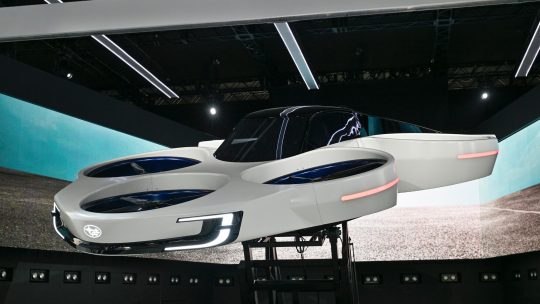
Subaru Air Mobility Concept Is Subaru Plans For The Highway In The Skies
One of the coolest eVTOLs we have seen thus far.
Follow us for more Tech Culture and Lifestyle Stuff.
#Aerospace#Electric Aircraft#Electric Vehicle#Flying Car#Multicopter#Personal Air Transport#Subaru#VTOL
9 notes
·
View notes
Text
Learned there's a flight company y(school?) Called Sealand flight. And they have the world's only licensed electric airplane.
1 note
·
View note
Text
[GIF] XPeng Aero HT X2

https://gifed.video/xpeng-aeroht-x2
0 notes
Text
Why is electrification necessary to prevent global warming? - Technology Org
New Post has been published on https://thedigitalinsider.com/why-is-electrification-necessary-to-prevent-global-warming-technology-org/
Why is electrification necessary to prevent global warming? - Technology Org
Expanding renewable energy is the best way to reduce CO2 emissions
In Japan, more than 90% of CO2, which is the main greenhouse gas, comes from the energy consumption process of combustion engines or thermal power generation. The most effective way to reduce CO2 emissions is to replace fossil fuels with fossil-free energy sources by energy transformation. Among the fossil-free energy sources, solar and wind power generation systems have been pushed forward in the world, and it is thought that it will be possible to generate all electricity with renewable energy from these and other fossil-free energies. Accordingly, the worldwide implementation of restrictions on gasoline-fueled vehicles and the growing utilization of electric vehicles (EV) are based on the assumption that all electricity generation will eventually use alternatives to fossil fuels.
A 45cm2 flexible perovskite solar cell monolithic mini-module developed at Professor Segawa’s laboratory
In recent years, the RE100 (Renewable Energy 100%) global initiative, in which members commit to operating their businesses using only renewable electricity, has expanded to more than 400 companies. The use of renewable energy has become a social responsibility, so any companies that fail to use it will end up being ostracized from the supply chain.
In the case of the U.S. state of Hawaii, where legislation was introduced decreeing that 100% renewable electric energy must be used by 2045, the state government decided to offer tax incentives to consumers as well as businesses that promoted the use of solar power. Now, when solar panels and storage batteries are installed on many offices and houses, the owners receive a tax credit. Since electricity prices in Hawaii are higher than in Japan, the tax credits for solar panel and storage battery packages are proving to be a huge benefit for normal households, and it seems likely that the 100% renewable energy target will be met before the 2045 deadline.
In contrast, Japan’s Sixth Strategic Energy Plan aims to achieve just 36% to 38% renewable energy-based electricity usage by 2030. However, at the current pace, it is unlikely that even this target will be reached as the current Feed-in Tariff (FIT) and Feed-in Premium (FIP) systems hardly work as an incentive to introduce renewables. Perhaps the Japanese government should also start offering tax credits to get companies to utilize their internal reserves. Likewise, they should also encourage Power Purchase Agreements (PPA) — direct agreements between providers of renewable energy and commercial users of electricity whereby the user receives a stable supply of solar power without having to pay up-front costs.
It is also important to consider where renewable energy facilities should be installed — a particularly important issue in a country like Japan where space is limited. With regard to wind power, prospects for offshore wind farms are promising, as that is where the wind is at its strongest and environmental issues can best be avoided. In the field of solar power generation systems, research and development has been proceeding on lightweight, high-efficiency solar cells that can be installed anywhere, such as on the roofs of factories or building walls. One such type is “perovskite solar cells” using organometal iodide. Since Japan is the world’s No. 2 producer of the iodine used in these cells, we can avoid some of the resource-related problems associated with conventional solar cells. Maybe it will be possible in the future to even develop high-performance cells that can be used in things such as EV roofs and electric aircraft. Japan must invest in the development of these types of new technology for renewable energy.
Source: University of Tokyo
You can offer your link to a page which is relevant to the topic of this post.
#aircraft#batteries#battery#Building#cell#Cells#CO2#Companies#consumers#development#efficiency#electric aircraft#electric vehicles#electricity#electrification#Emissions#energy#Energy & fuel news#energy consumption#energy sources#engines#Environmental#Environmental Issues#EV#Facilities#Factories#fossil#fossil fuel#Fossil fuels#fuels
0 notes
Text
It’s Boom Times for Startups Trying to Electrify Aviation
Since the Wright brothers invented the airplane in 1903, one aspect of how we fly hasn’t changed. Evolving plane design and improved engines aside, almost all modern aircraft have one thing in common: They’re powered by combustible fuels. That may be changing, though. Just as electric cars have started to revolutionize driving, a growing group of startups are now looking to electrify air…

View On WordPress
#air travel#aircrafts#aviation industry#electric aircraft#electric vehicle#electrifying aviation#startups#wright brothers
0 notes
Text

Regardless of what platform was used to shoot this particular photo, wasn't the Canberra a beautiful aircraft?
@Tempest_books via X
139 notes
·
View notes
Text

Lightning F.6 from RAF 11 Sqn climbing out of Malta International - 13 July 1978
#RAF#English Electric Lightning#Electric Lightning#Lightning F6#Fighter#aircraft#military#jet#Royal Air Force
56 notes
·
View notes
Text

8 Different Types of Helicopters and Their Uses
1. Single Rotor Helicopter:
A single-rotor helicopter has one main rotor for lift and thrust and a smaller tail rotor for counteracting torque. It is the most common design, known for simplicity and efficiency in most flight conditions. Examples include the Bell 206 and Robinson R44.
2. Tandem Rotor Helicopter:
Tandem rotor helicopters have two main rotors mounted at opposite fuselage ends, rotating in opposite directions to counteract torque. This design allows for a higher payload capacity. Examples include the CH-47 Chinook.
3. Coaxial Helicopter:
Coaxial helicopters have two main rotors mounted on the same axis but rotating in opposite directions. This eliminates the need for a tail rotor and improves stability, efficiency, and maneuverability. The Kamov Ka-52 is a well-known example.
4. Compound Helicopter:
Compound helicopters combine rotor systems with other propulsion methods, such as fixed wings or auxiliary propellers, to improve speed and efficiency. Examples include the Sikorsky X2 and Eurocopter X3.
5. Tilt Rotor Helicopter:
Tiltrotor aircraft can transition between vertical lift (like a helicopter) and forward flight (like an airplane) by tilting their rotors. They are faster and more versatile. The V-22 Osprey is a prominent example.
6. Intermeshing Rotor Helicopter:
These helicopters have two rotors that intermesh at an angle, eliminating the need for a tail rotor and providing excellent lift. The Kaman K-MAX is a key example.
7. Electric Helicopter:
Electric helicopters use electric motors powered by batteries, offering quieter operation and zero emissions. They are typically used for training or short-distance transport.
8. Military Attack Helicopter:
Designed for combat, these helicopters are heavily armed with missiles, rockets, and guns. They excel in ground attack and support roles. The AH-64 Apache is a leading example.
#helicopter#navy#air force#army#world war ii#aviacion#automotive#automobile#electric vehicles#aircraft#globe#steps
29 notes
·
View notes
Text

Bell XP-59A. The first U.S. turbojet Aircraft, powered by General Electric J31, was derived from Frank Whittle's turbojet and sent to the U.S. in great secrecy in 1941. ➤VIDEO: https://youtu.be/I0Rf8_navA4 ➤TURBOJET VIDEOS: https://dronescapes.video/Turbojet
#youtube#aircraft#airplane#aviation#dronescapes#documentary#military#aviation history#ww2#wwii#Bell#Bell XP59#lockheed f 80#lockheed p 80#lockheed#sir frank whittle#frank whittle#general electric#J31#Jet Age#turbojet#inventor#aircraft engineering#engineering
49 notes
·
View notes
Text





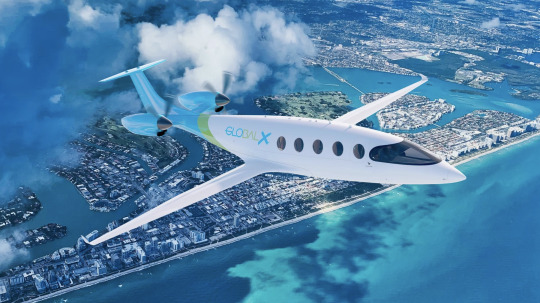
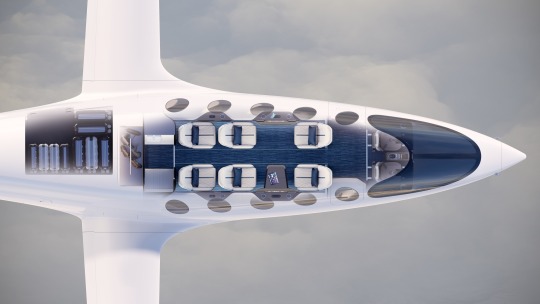
"Alice" All-Electric Aircraft.
With a passenger capacity of 6, the executive cabin, which is six-foot four-inches wide, features a fully equipped galley with a lavatory and sink, a wardrobe to stow jackets and other personal belongings, a side panel at each seat with a foldable table, personal power outlets, and USB plugs.
Each seat has a panoramic window that is 22 inches high and 16.5 inches wide.
The prototype first flew on 27 September 2022, and the projected service entry date is 2027.
Credit photo: Eviation Aviation
#art#design#luxury pad#ultimate pad#interior design#luxurypad#concept#pad#alice#aircraft#private jet#jetset#jet concept#plane concept#all-electric#eviation aviation#interiordesign#interiors#billionaire#billionairelife#travels#flyingprivate#flyingpalace
205 notes
·
View notes
Photo
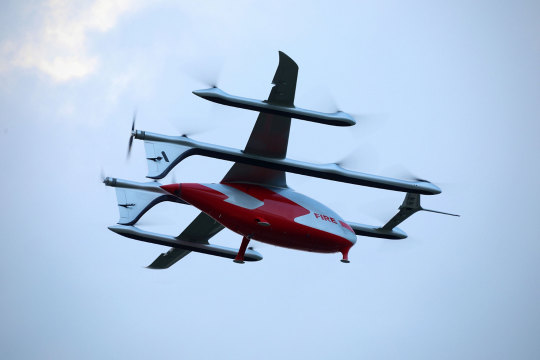
AutoFlight Unveiled Autonomous Firefighting eVTOL With A Takeoff Weight Of Two Metric Tons (!)
👍🏻
Follow us for more Tech Culture and Lifestyle Stuff.
4 notes
·
View notes
Text
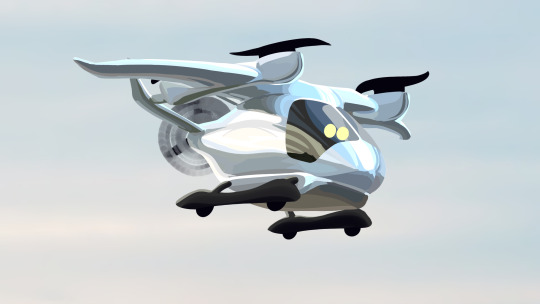
No drones at the airport!!!! unless they are Alia 250
110 notes
·
View notes
Video
Illustration by Frank Wootton for a 1958 advertisement for the English Electric Lightning by totallymystified
#English Electric#Lightning#aircraft#airplane#aeroplane#jet#aviation#illustration#retro#vintage#nostalgia#Frank Wootton#1958#1950s#50s#fifties#flickr
14 notes
·
View notes
Text
youtube
Combat service of Lightning
#english electric lightning#lightning#english electric#history#military aircraft#military history#cold war#fighter jet#saudi arabia#royal air force#Youtube
4 notes
·
View notes
